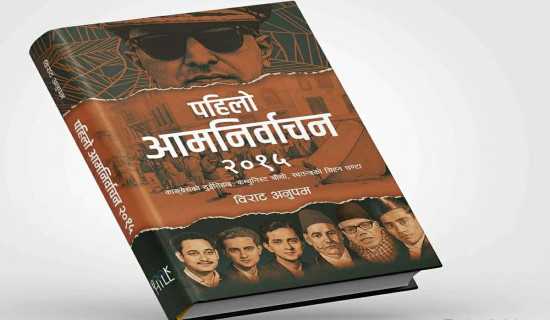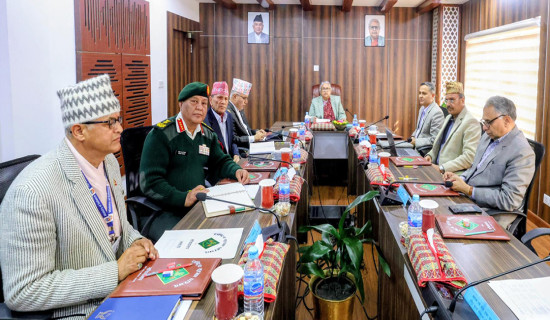- Wednesday, 4 March 2026
Nepal Olympic Committee At A Crossroads
With internal conflicts reaching their peak, the Nepal Olympic Committee (NOC) faces the looming threat of suspension from the International Olympic Committee (IOC). As the NOC prepares for its executive board election, escalating internal strife has plunged the organisation into a state of uncertainty.
The NOC is set to hold its executive committee election in December. The executive board, elected in 2019 for a four-year term, had its tenure extended by one year due to the upcoming 2024 Paris Olympics. This extension, now nearing its end, has left the NOC functioning in an ad hoc capacity.
The discord intensified when President Jeevan Ram Shrestha unilaterally pushed through an amendment to the statute during a Special General Assembly, enabling him to contest for a third consecutive term as NOC President. A former parliamentarian, Shrestha was first elected president in 2015 and re-elected in 2019 for a second term.
To fulfil his ambition, Shrestha not only violated the Sports Development Act 2020 but also disregarded a High Court ruling and an IOC recommendation against proceeding with the statute amendment.
Legal violations
Nepal’s Sports Development Act 2020 explicitly bars executive members of any sports body from running for a third term. Additionally, the High Court issued an interim order prohibiting discussions on the statute amendment during the special general assembly until it could rule on the timing's appropriateness.
This legal action followed a writ filed by four Olympic-affiliated sports associations: the Nepal Rugby Association, the Nepal Skating and Skateboarding Association, the Nepal Baseball and Softball Association, and the Nepal Equestrian Association.
These associations accused the NOC of deliberately denying them membership to suppress dissent and competition. The associations have demanded fair representation and inclusion within the NOC.
Despite the court's directive, the NOC proceeded with the amendment. The National Sports Council (NSC) had also warned the NOC, through letters and public notices, to defer the assembly in light of the court order.
Similarly, the IOC also expressed concerns over the governance implications of amending the statute so close to the election. In a letter cited by media reports, the IOC emphasised that such changes undermined transparency and increased the risk of foul play. The global body recommended postponing amendments until after the election.
However, President Shrestha remained adamant, unilaterally pushing the statute change through the Special General Assembly.
Controversial amendment
Clause 25(1) of the original NOC statute prohibited the President and Secretary General from serving more than two consecutive terms. It also disqualified candidates aged 70 or older and set a four-year term for the executive board.
The conflict surfaced when Shrestha proposed amending this clause to allow him to seek a third consecutive term.
This triggered widespread dissent among central committee members, many of whom aspire to leadership roles. They argued that Shrestha’s actions undermined the spirit of democratic governance within the organisation.
Despite opposition, Shrestha, backed by a majority of supporters, secured the amendment’s approval from the executive board. The changes were later ratified at a special general assembly, where 20 of the 26 attending members voted in favour.
The amendment now allows the President and Secretary General to serve up to four consecutive terms and raises the age limit for candidates from 70 to 75 years.
Shrestha, a towering figure in the NOC, first served as president in 1997 and later completed two terms as secretary general (2007–2015). He returned to the presidency in 2015 and 2019. While his 18 years of contributions to the NOC are notable, his bid for a third term has alienated former allies and intensified internal divisions.
Several central committee members who once supported Shrestha have now voiced their opposition, accusing him of prioritising personal ambitions over organisational welfare.
Secretary General Nilendra Raj Shrestha, who announced his candidacy for the presidency, criticised the statute amendment, accusing Shrestha of violating state laws and acting unilaterally.
The tension between President Shrestha and Secretary General Nilendra worsened after the former allegedly blocked Nilendra’s access to the NOC’s official email account. Nilendra also accused Shrestha of corresponding with the IOC without consulting the Secretary General, exacerbating internal mistrust.
Risk of IOC suspension
The mounting legal contradictions and deepening internal conflicts have jeopardised Shrestha’s position, casting a shadow over the legitimacy of the amendment process. His rivals have intensified lobbying efforts at the political level, raising the possibility of government intervention, which could result in direct action against NOC leadership.
Such intervention or an adverse court ruling poses a significant risk of suspension from the IOC. The IOC has a strict policy against government interference in National Olympic Committees and could suspend the NOC if it finds violations of its governance principles.
The IOC has already sent a letter to President Shrestha and Secretary General Nilendra requesting clarification regarding the ongoing lawsuits and advising against taking further action until the court resolves the matter. Reports suggest the IOC has also warned it will cease correspondence with the NOC until these issues are clarified.
While the statute amendment has cleared the way for Shrestha to contest for a third term, it does not guarantee his victory. With the election set for the last week of December, the shifting dynamics within the NOC suggest a difficult path ahead for the incumbent president.
Opponents are leveraging ongoing legal battles and IOC scrutiny to strengthen their campaigns, arguing that Shrestha’s continued leadership would harm the organisation’s reputation and effectiveness.
Although Shrestha claims the statute changes align with the Olympic Charter and have IOC approval, the ongoing disputes, court cases, and governance shortcomings could provide sufficient grounds for IOC sanctions.
The NOC stands at a crossroads. With escalating scrutiny from domestic and international stakeholders, its leadership faces a critical challenge to restore credibility and navigate these turbulent times.
(The author is associate editor at The Rising Nepal.)

















